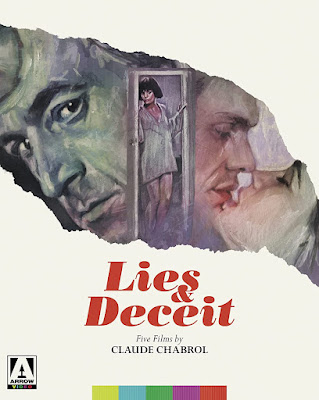- Director : Claude Chabrol
- Media Format : Anamorphic, NTSC, Widescreen
- Run time : 9 hours and 17 minutes
- Release date : February 22, 2022
- Actors : Isabelle Huppert, Emanuelle Beart, Lucas Belvaux, Francois Cluzet, Stephane Audran
- Studio : Arrow Video
- ASIN : B09MSP9DRN
- Country of Origin : USA
- Number of discs : 5
Claude Chabrol began as a film critic for the French film
magazine/journal Cahiers du cinema before he got his start as a filmmaker, and his
films have always been an intellectual playground because of this. While not as
widely celebrated as some of his fellow critics-turned-filmmakers, Chabrol had
the ability to blend arthouse sensibilities with genre narratives, often compared
to Alfred Hitchcock in his approach and preoccupation with thrillers. The Arrow
Video release of Lies and Deceit contains five classics from the French New Wave
filmmaker, including Torment, Betty, Madame Bovary, Inspector Lavardin, and Cop
Au Vin.
The special edition releases of the films for Arrow Video’s
box set includes a plethora of extras on each disc/for each film, along with
the 1080p high-definition presentation of the films themselves. Madame Bovary,
Betty, and Torment are each presented with 4K restorations. Each of the films have
introductions by film scholar Joël Magny, along with select-scene commentaries
by Chabrol for each.
Cop Au Vin (Poulet Au Vinaigre)
This 1985 crime film involves a small town in rural France
that becomes the center of a murder investigation by Inspecteur Jean Lavardin (Jean
Poiret). Lavardin arrives in the provincial town to solve the mystery involving
the death of the local butcher Gérard Filiol (Jean-Claude Bouillaud).
Chabrol takes the police procedural and uses it to examine the small-town
community and each of the characters within it.
Special Features:
-New commentary by critic Ben Sachs
-New interview with film historian Ian Christie
-Claude Chabrol at the BFI, Chabrol on stage with film
historian Ian Christie in 1994
-Claude Chabrol, Jean Poiret & Stephane Audran in
conversation, archive Swiss TV episode with director and cast discussing Cop Au
Vin
Inspector Lavardin
Cop Au Vin was successful enough to inspire the sequel film,
Inspector Lavardin, which brings back the detective (and actor Jean Poiret)
from the first film to solve another mystery. This time a Catholic writer has
been murdered, his body found on a beach with the word “pig” written on his
back. To complicate matters even further, Lavardin discovers the victim’s widow
(Bernadette Lafont) is a former lover of the inspector. This is one of the
films that has earned Chabrol comparison to Hitchcock, as well as noticeable influences
from Orson Welles.
Special Features:
-New commentary by critic Ben Sachs
-Why Chabrol?, new interview with film critic Sam Wigley on
why Chabrol remains essential viewing
Madam Bovary
Based on the 1857 novel Madame Bovary by French author
Gustave Flaubert, Claude Chabrol’s 1991 release of Madame Bovary was not the
first adaptation, nor would it be the last. Set in 1950s Normandy, the
narrative follows Emma Bovary (Isabelle Huppert), a beautiful but restless
young woman who fantasizes of a more exciting life, and eventually creates one
with the drama caused by her behavior. The film was nominated for the Golden
Globe Award for Best Foreign Language Film as well as for the Academy Award for
Best Costume Design, though it did not win either.
Special Features:
-New commentary by critic Kat Ellinger
-Imagining Emma: Madame Bovary on screen, new visual essay by
film historian Pamela Hutchinson
Betty
When he wasn’t attempting to imitate the murder mysteries of
Alfred Hitchcock, Chabrol was often focused on the depiction of upper-class
lifestyles, and Betty (1992) is a perfect example of this preoccupation.
The protagonist and title character, Betty (Marie Trintignant) is an amoral
woman whose selfish actions are only outdone by the cold calculated reactions
from the bourgeois family she has married into. We join this protagonist
behaving unsympathetically, over-indulging in liquor, cigarettes, and men in
various bars when a sympathetic older woman named Laure (played by Chabrol’s
ex-wife, Stéphane Audran) takes Betty under her wing.
Special Features:
-New commentary by critic Kat Ellinger
-Betty, from Simenon to Chabrol, new visual essay by French
Cinema historian Ginette Vincendeau
-New interview with Ros Schwartz, the English translator of
the Georges Simenon novel on which the film is based
Torment (L’Enfer)
If Betty was about a coldly selfish spouse, Torment
is about a husband that fears his wife is hiding the same tendencies,
essentially only having her youth and beauty as evidence. A young Emmanuelle
Béart is absolutely breathtaking as Nelly, though it is François Cluzet who
carries out the psychological torment of the title with his performance as the
husband, Paul. Paul and Nelly run a modest country hotel together, but his
paranoia over slight flirtations leads to a debilitating preoccupation that
threatens to destroy both their business and marriage. Cluzet works hard to
portray this internal conflict of a man unable to silence the obsessive
distrust, whereas Béart is little more than a pristine prize for Paul to hoard
from the perceived envy of other men.
Special Features:
-New commentary by critics Alexandra Heller-Nicholas and Josh
Nelson
-On Henri Georges Clouzot, archival interview with Chabrol
about, Clouzot’s abandoned attempt to make L’enfer
-Interview with Marin Karmitz, archive interview with
Chabrol’s most frequent producer from 1985 onward
Additional Special Features:
-Theatrical trailers and image galleries for all films
-80-page collector’s booklet of new writing by film critics
Martyn Conterio, Kat Ellinger, Philip Kemp and Sam Wigley, and archive material
-Limited edition packaging with newly commissioned artwork by
Tony Stella
-Original lossless French PCM mono audio on Cop Au Vin,
Inspector Lavardin, Madame Bovary and Betty
-Original lossless French PCM stereo audio on Torment
-Optional English Subtitles
Entertainment Value:
6.5/10
Quality of
Filmmaking: 8/10
Historical
Significance: 8/10
Special Features: 8.5/10

No comments:
Post a Comment
Agree? Disagree? Questions for the class? All comments are welcome...